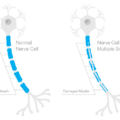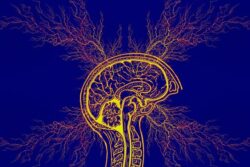An alarming number of children–in the United States and other industrialized countries—are being diagnosed with Autism Spectrum Disorder (ASD) or autism, a group of complex brain disorders. The medical community’s views about why the incidences of autism are escalating remain varied. Many believe genetics and environmental pollutants may serve as risk factors. Some believe vitamin D deficiency may be linked to the mounting cases of autism.
Vitamin D’s Importance to Brain Development
The link between brain development and vitamin D is far from new to me and other vitamin D experts. Autism may be caused–at least in part—by genetic impairment to a child’s developing brain. Vitamin D plays an essential role in brain development by influencing genetic expression.
Every cell in the brain includes vitamin D receptors (VDR) that control genes that influence brain development. In order to regulate gene expression, the VDR in the brain cells must be turned on by receiving activated vitamin D. Without sufficient vitamin D to activate its receptors, the brain cannot properly develop.
A Landmark Study
A groundbreaking study from Sweden has revealed that children who develop ASD have significantly lower vitamin D levels at birth than their non-ASD siblings.
The Swedish team, led by award-winning autism researcher Elisabeth Fernell, M.D., analyzed the circulating vitamin D levels (25-hydroxy (OH) vitamin D) of 58 Swedish-born sibling pairs, in which one sibling had ASD, the other did not. The children with ASD had significantly lower vitamin D levels at birth than their respective typically developing sibling. Of the paired siblings, the study included 28 pairs where the mother was of Swedish origin, 18 pairs who had African or Middle Eastern mothers, and 12 pairs with “miscellaneous” [1] maternal ethnicity.
The darker one’s skin, the more challenging it is to make vitamin D. Melanin, the pigmentation in our skin, absorbs ultraviolet B rays to synthesize vitamin D from sunlight. Not surprisingly, the researchers found an increased risk of ASD in offspring of dark-skinned moms as well as mothers who wear concealing clothing for cultural reasons.
In fact, many of the newborns with African and/or Middle East heritage had vitamin D levels that were barely traceable. Moreover, the researchers determined that their season of birth did not account for the differences. The research team opined that children born to dark-skinned mothers were exposed to “suboptimal” vitamin D levels during the year.
Finally, the authors of the Swedish study state, “Although low levels of vitamin D could have a genetic origin and as such be associated with ASD, our study is the first to rule out ASD-related lifestyle mechanisms as explanations for low 25(OH)D levels, since the samples were taken in the newborn period.” ASD-related lifestyle mechanisms include indoor living and dietary limitations.
Adequate Maternal Vitamin D May Prevent Autism
Newborns depend solely upon their mother’s nutrition for their cellular development including vitamin D levels. The founder of the Vitamin D Council, John Cannell, M.D., aptly stated that the brain levels of activated vitamin D in a baby “directly depend on the amount of vitamin D the mother makes in her skin or puts in her mouth.”
And, indeed, the findings of the Swedish study, recently published in the journal Molecular Autism, indicate that prenatal vitamin D deficiency may act as a risk factor for ASD in the child. The measurement of maternal vitamin D however was not included in this study. This omission in the study design also precluded a better understanding of the role genetic and environmental factors play in autism development.
Nonetheless, the researchers’ conclusion is implicit: vitamin D is essential to fetal development. These leading-edge results serve as a reminder to all women of reproductive age: ensure your vitamin D levels are adequate by getting a 25(OH)D test and taking a daily vitamin D3 supplement and/or getting optimal sun exposure.
It is also important to note that pregnant mothers typically rely on their prenatal vitamins, most of which only contain enough vitamin D to prevent rickets. Taking prenatal vitamins without supplementing with extra vitamin D3 provides expectant mothers a false sense of health for their babies, as well as a potential risk for their children to develop autism.
Footnote (1): Study participants in the designated “miscellaneous” group are of non-Scandinavian Europe, South America, and East Asia ethnic origins.
Note: For a further look at vitamin D’s role during pregnancy, lactation, and neonatal life, I offer my December 2014 article that includes vitamin D supplementation guidelines for pregnant and nursing mothers as well as babies.
About the Author: Susan Rex Ryan, author of the award-winning vitamin D book Defend Your Life, is dedicated to vitamin D awareness. Her extensive collection of health articles can be found on Hormones Matter as well as on her blog at smilinsuepubs.com. Follow Sue on FB “Susan Rex Ryan” and Twitter @vitD3sue.
Copyright © 2015 by Smilin Sue Publishing, LLC
All rights reserved.









